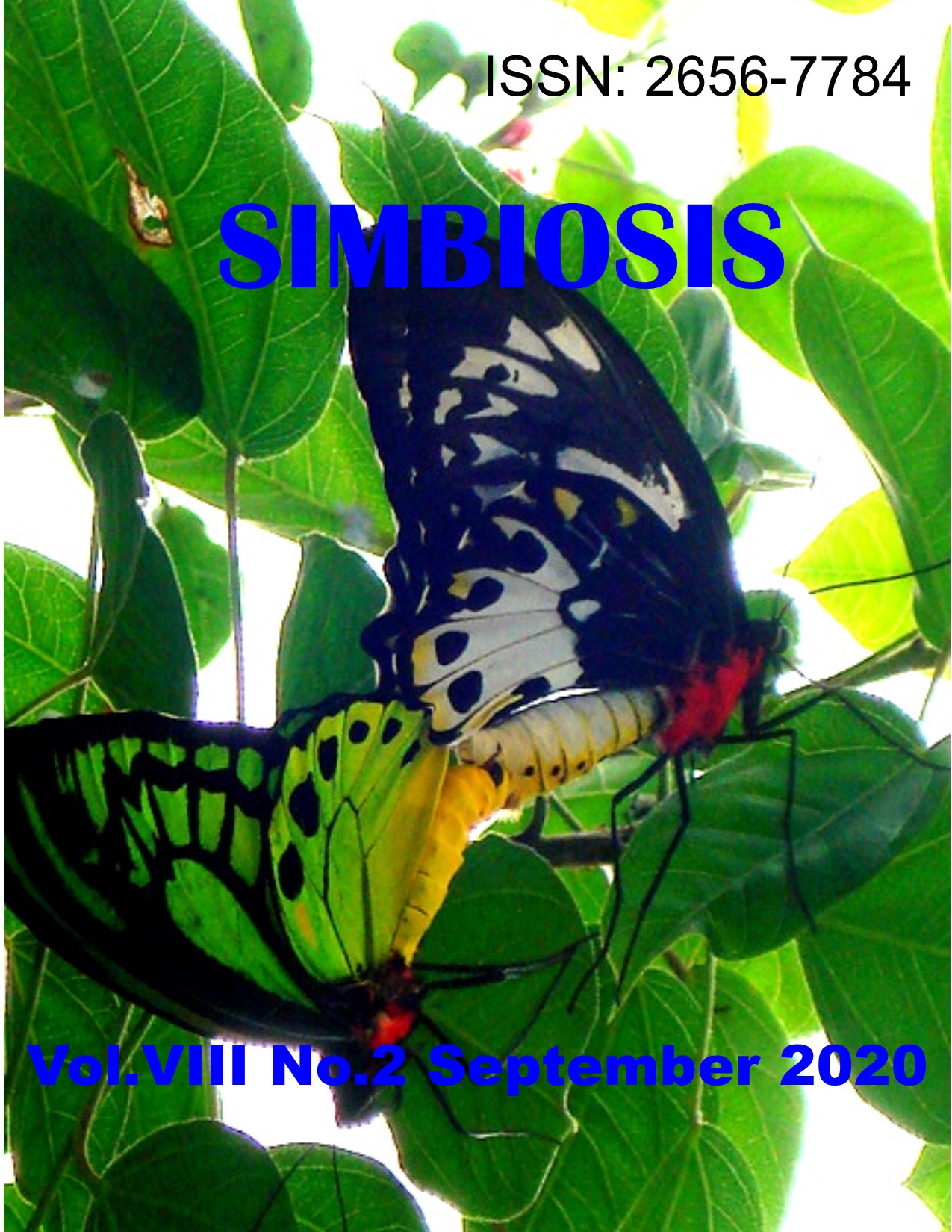VARIASI POLA SIDIK JARI MASYARAKAT SUKU KAILI DAN SUKU TORAJA DI KOTA PALU DAN KABUPATEN SIGI, SULAWESI TENGAH
Abstract
A research on the variation of fingerprint patterns of Kailinese and Torajanese tribes have been done in Palu and Sigi Regency, Central Sulawesi. The aims of this research were to determine the variation of fingerprint patterns, Dankmeijer Index, Furuhata Index and Total Ridge Count of Torajanese and Kailinese. The population was divided into three groups, namely the Kaili Da'a (Kaili tribe which has phenotypic characteristics resembling the Australomelanesoid race), other Kaili groups and the Toraja tribe belonging to the Mongoloid race. The samples of fingerprints were taken by using the purposive sampling method with a total of 180 probandus, consisted of 60 people (30 males and 30 females) in each ethnic group. The tips of ten fingers were rubbed with paper that had contained 4B pencil rubbing, fingerprints were taken using clear tape and then the tape affixed on a probandus form. Data was analysed by Chi-square test and Student-t test. The fingerprint analysis showed that there were four fingerprint patterns found among the Kailinese and Torajanese tribes. The highest whorl frequency was found in the Torajanese at 50.17%, whereas Da'a and other Kaili groups had higher loop frequencies. Whorl type analysis showed simple whorl was the type most commonly found in all three populations. Furthermore, double loop whorl and the least frequency was the central pocket whorl. The Furuhata Index values ??for the Toraja, Kaili and Kaili Da'a tribes respectively were 102.73; 57,37; and 95.06 while the Dankmeijer Index values ??were 1.99; 5,61; and 2.77. The average of total ridge count in the Toraja, Kaili and Kaili Da'a tribes respectively were 134; 128.08 and 133.56.
Downloads
References
De Jongh, Arent., A. R. Lubach., S. L. L. Kwie and I. Alberink. 2019. Measuring the Rarity of Fingerprint Patterns in the Dutch Population Using an Extended Classification Set. Journal of Forensic Science, 64 (1): 108-119.
Hidayati, F. 2015. Variasi Pola Sidik Jari pada Populasi Jawa dan Papua. AntroUnairdotNet, IV (1): 30-41.
Jacob, T. 1981. A Dermatoglyphic Study in Klaten, Central Java. Berkala Bioantropologi Indonesia, 1(2) : 87-102.
Junitha, I. K. 2005. Pola Sidik Jari Masyarakat Bali Aga: Desa Tenganan Pengrigsingan dan Desa Terunyan. Jurnal Biologi, 9 (1) :8-12.
Karthick, R., K. M. K. Masthan, N. A. Babu., R. J. Krupa and N. Anitha. 2015. Dermatoglyphics – A Review. Biomedical and Pharmacology Journal, 8: 417-420.
Lakshmi, P. J. and R. Thenmozhi. 2014. A Short Review on Dermatoglyphics. Journal of Pharmaceutical Sciences and Research, 6 (4): 200-202.
Mavalwala, J., D. R. Swindler and E. E. Hunt. 1963. The Dermatoglyphics of the West Nakanai of New Britain. American Journal of Physical Antrhopology, 21(3):335-340.
Oktaviona, M. 2011. Distribusi Tipe Tonjol Carabelli Gigi Molar Pertama dan Variasi Bentuk Shovel Gigi Insisivus Pertama di Rahang Atas pada Mahasiswa FKG USU Angkatan 2007/2008, 2008/2009. Tersedia dalam http://www.repository.usu.ac.id/bitstream/12345678/23874/4/Chapter%2011.pdf Diakses 20 September 2019.
Paembonan, L., A. M. Palampanga., C. Tindjabate and M. Moelyono. 2018. Migrant Torajans in Palu City Central Sulawesi Province in The Perspective of Social Economic and Culture. International Journal of Graduate Research and Review, 5 (1): 95-100.
Purbasari, K. dan A. R. Sumadji. 2017. Variasi Pola Sidik Jari Mahasiswa Berbagai Suku Bangsa di Kota Madiun. Jurnal Florea, 4 (2): 47-54.
Purwanti, S. H. 2016. Mengenal DNA Populasi Batak, Jawa, Dayak, Toraja dan Trunyan. RAYYANA Komunikasindo. Jakarta.
Rahayu, R. 1997. Analisis Delesi 9-Pasangan Basa DNA Mitokondria pada Populasi Suku Batak, Suku Toraja dan Suku Jawa. Skripsi S-1 FMIPA Universitas Indonesia (Tidak dipublikasikan).
Rahim, A. R. 2017. Mengenal Lebih Dekat Tana Toraja. Kementrian Pendidikan dan Kebudayaan. Jakarta.
Ramani, P., Abhilash, H. J. Sherlin, Anuja, P. Premkuman, Chandrasekar, Sentamilselvi and Janaki. 2011. Conventional Dermatoglyphics_Revived Concept: A Review. International Journal of Pharma and Bio Science, 2 (3).
Rismalia. 1998. Analisis Delesi 9-Pasangan Basa dan Motif Polinesia pada DNA Mitokondria Empat Populasi Suku di Sulawesi. Skripsi S-1 FMIPA Universitas Indonesia (Tidak dipublikasikan).
Saleh, S. 2013. Kearifan Lokal Masyarakat Kaili di Sulawesi Tengah. Jurnal Academica FISIP UNTAD, 5 (2): 1126-1134.
Samehsalari, S., K. R. Reddy and K. Mohsenpour. 2016. The Incidence of Finger Ridge Counts among the Christian Population of Mysore, India. International Journal of Modern Anthropology, 9: 66-75.
Tadjudin, M. K., W. Ramelan dan A. Suar. 1970. Dermatoglifik Djari-Djari Tangan pada Beberapa Suku di Indonesia. Laporan Seminar Biologi ke-2: 639-660.
White, N. G. 1979. The Use of Digital Dermatoglyphic in Assessing Population Relationships in Aboriginal Australia. Birth Defects, 15 (6): 437-454.
Widianto, H. 2018. Manusia Modern Awal, In Indonesia dalam Arus Sejarah, edited by Truman Simanjuntak and Harry Widianto, Jilid 1, 162–177. Kementerian Pendidikan dan Kebudayaan Republik Indonesia. Jakarta.
Wiradnyana, K. 2015. Budaya Austronesia di Indonesia Bagian Barat dalam Kaitannya dengan Migrasi Out of Taiwan. Berkala Arkeologi Sangkhakala, 18 (1): 22-39.
Yang, X., J. Xiaojun., Z. Yixuan and L. Hui. 2016. Genetic Rules for The Dermatoglyphics of Human Fingertips and Their Role in Spouse Selection: A Preliminary Study. Springerplus, 5: 1-6.
Yuniawati, D. Y. 2016. Keterkaitan Etnik Da’a di Wilayah Pedalaman Pegunungan Gawalise, Sulawesi Bagian Tengah, dengan Populasi Australomelanesoid di Sulawesi. Jurnal Penelitian dan Pengembangan Arkeologi, 34 (1): 1-18.

This work is licensed under a Creative Commons Attribution 4.0 International License.










